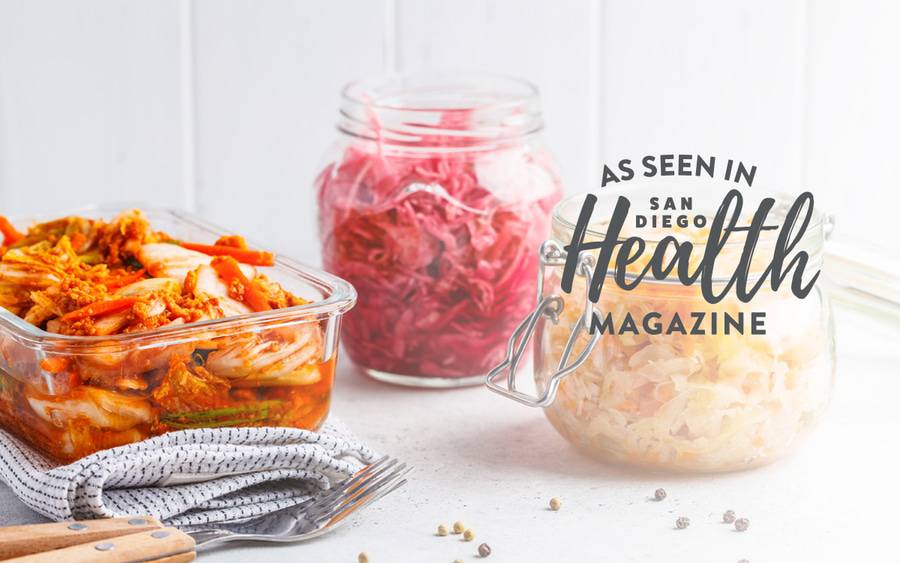How to Improve Your Gut Health
Fermented and probiotic foods can make a difference

Fermented and probiotic foods can make a difference
Believe it or not, you have more bacteria and other microbes in your gut than human cells. Roughly 100 trillion bacterial, fungal and viral microbes call your gut home.
When in balance, they work to support the immune system, modulate hormones, metabolize nutrients, regulate chronic and inflammatory diseases, and send signals to the brain that influence various aspects of our health, including mood, stress and pain.
What we eat — or don’t eat — can have a significant impact on gut inflammation and the makeup of the gut microbiome. A healthy, nutrient-rich diet focused on lean proteins, whole grains, legumes, fruits and vegetables can help keep your gut microbiome working at an optimum level.
A growing body of research indicates that adding probiotics via supplements or fermented foods, such as yogurt, miso, pickles, sauerkraut, kimchi and kombucha, can increase the diversity of your gut flora, restore microbial balance and improve your overall health.
“Fermented foods and probiotics create more of a positive milieu so that bad bugs have a harder time proliferating,” says Robert Bonakdar, MD, director of pain management at Scripps Center for Integrative Medicine, and a family medicine physician at Scripps Clinic. “They tend to lower stomach acid to a level where, if we are exposed to things that can cause problems, they’re less likely to have a friendly environment.”
Inflammation and disease
On the flip side, people who have less microbial diversity — likely stemming from a diet high in processed foods and unhealthy fats — are more prone to inflammatory conditions and certain types of chronic pain. An imbalanced system may also play roles in cancer, diabetes, inflammatory bowel disease, obesity, depression and many other conditions.
The microbiota also influences global health — and working to ward off infectious disease locally may help protect people around the world.
“It’s not a direct correlation, but the gut is where most of our immune system starts, and if we can fortify it, increase diversity, increase more fermentable foods, we have a better chance of using our innate immune system to keep us healthy and the world healthy,” says Dr. Bonakdar. “Because when one part of the world is unhealthy, it tends to travel, and we see that in other populations.”
Fermented and probiotic foods
Dr. Bonakdar recommends upping your intake of cultured and probiotic foods (aim for three servings a day) for digestive health. But be careful to read labels and make sure they contain active cultures and little to no added sugar.
“Fermentable foods scare some people because they think the process of fermentation creates dangerous bacteria, but in many cases, we’re already eating fermentable foods, whether we know it or not,” he says.
For those who can’t tolerate fermented foods, or who do not find them palatable, probiotic supplements may be the answer. But not all probiotics are created equal. Smartphone apps like Probiotic Guide USA can help users find trusted brands and supplements that address specific concerns, such as irritable bowel syndrome, migraines or even eczema.
Common fermented foods
- Kefir
- Plain yogurt
- Fermented cottage cheese
- Certain aged cheeses (check label for live and active cultures)
- Fermented vegetables
- Tempeh - miso (refrigerated)
- Pickles (pickled with salt, not vinegar)
- Sauerkraut (choose refrigerated)
- Kimchi
- Kombucha (choose sugar-free)
- Probiotic drinks, like sugar-free beet kvass, apple cider
Dr. Bonakdar is currently conducting a research study on the potential benefit of probiotics for patients suffering from both migraines and irritable bowel syndrome. Qualifying participants will receive compensation as well as complimentary treatment and laboratory/microbiome studies at the beginning and end of the trial. For more information, please contact 858-554-8931.

This content appeared in San Diego Health, a publication in partnership between Scripps and San Diego Magazine that celebrates the healthy spirit of San Diego.